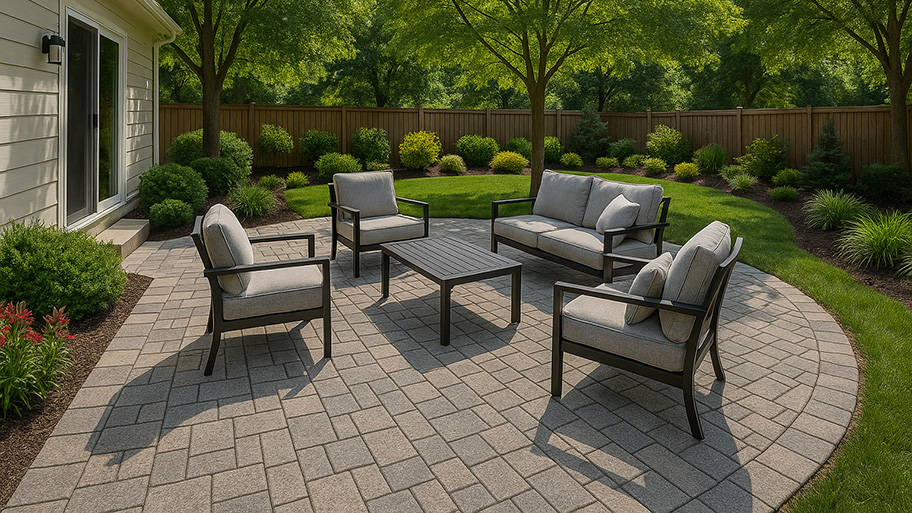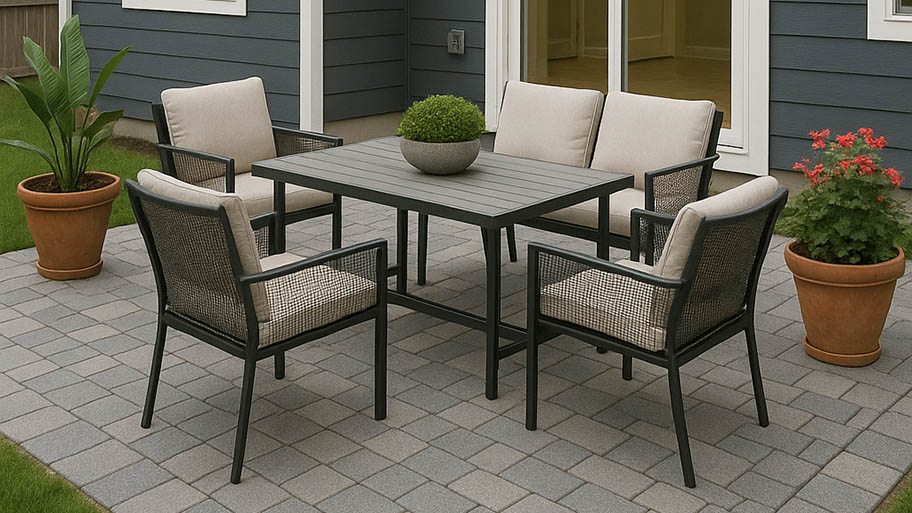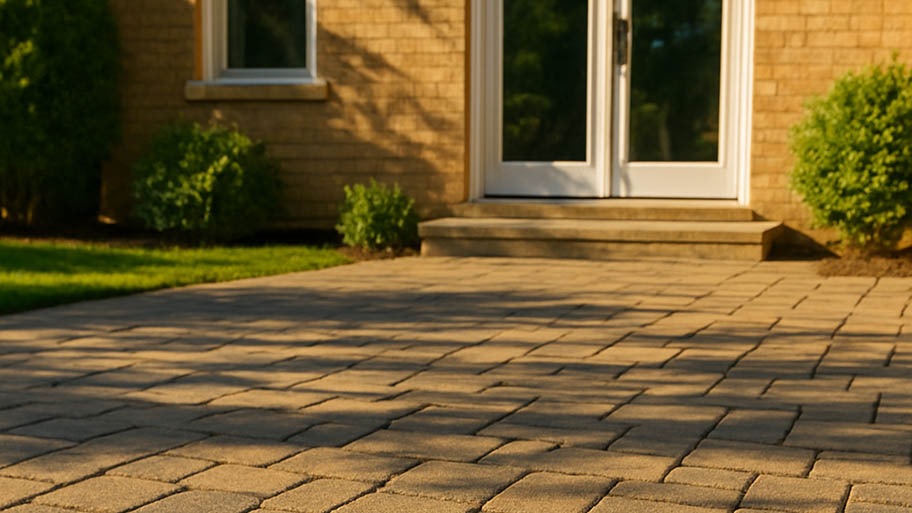
Thinking about installing concrete or brick pavers for a walkway or patio? Learn the cost of interlocking pavers in this informational guide.
Cleaning brick pavers is a DIY project you can knock out in a day


After so many footprints, spilled condiments, muddy paws, and rainy days, your pavers could probably use a little love. But if you’re wondering how to clean pavers, don’t worry: there are ways to restore them to their former glory. Cleaning your brick pavers is much less expensive than replacing them (the average cost to clean your pavers yourself is $375) and still offers a look that’s reminiscent of when you first installed them.
Patio chairs, potted plants, concrete cherubs, fire pits—it all needs to get moved. You want to clear the entire area of obstacles before you begin cleaning your brick pavers.
If you have any nearby decor, landscaping, appliances, or anything else that you can’t move easily, cover these up with a tarp.
Weeds are a common problem with pavers. Over time, the cracks of your pavers create tiny gardens for weeds and moss, as well as other natural growths. An important tip for cleaning paver stones: clear the surrounding area of these stray plants.
Don your gardening gloves and pull out the big weeds by the root, then use a stiff brush to loosen any moss. If necessary, follow up with a weed killer and wait for the recommended time period before continuing.
If you spy any tree roots that might uproot your pavers, you might want to get in touch with a local patio paver to discuss installing concrete footing as a barrier. You can also contact a local tree removal contractor to learn more about your options.
As a preliminary method of soaking, use your garden hose to completely saturate the paved area with water. This will help clean the brick pavers and loosen any dirt and debris while also preventing them from soaking up the cleansers and forming an unsightly residue.
Part of keeping your outdoor space at its best is choosing the right pavers for the area, but another major factor is cleaning those pavers with the right solution. That said, be sure to do a spot test on an inconspicuous area (maybe one usually covered by your grill?) before moving forward with your solution of choice.
Here are a few great solutions for cleaning brick pavers:
White (not dark) vinegar diluted with water
Simple Green, a gentle and chemical-free soap that is unlikely to ruin your paver stones
Dishwashing soap and water
"These solutions are great for cleaning pavers and are deemed environmentally safe," says cleaning expert Asya Biddle.
Once you’ve determined your preferred paver cleaning solution, fill up a bucket’s worth. For large areas, fill up a five-gallon bucket; for smaller areas, a one-gallon bucket should suffice.
Working in one area at a time, pour out some of your paver cleaning solution. Take a stiff, long-handled broom and scrub the area to clean the pavers. If your knees can take it, you can also use a scouring pad or wire hand brush to loosen up any dirt, stains, and grime.
Pavers are porous and will absorb any spills quickly. But different stains require different cleaning methods.
Oil stains: Use dish soap and warm water to wash the stain (either with a mop or a small handheld brush). For tougher stains, use a concrete cleaner or baking soda paste. If you catch the stain immediately while it’s wet, you can also sprinkle cat litter on the oil and let it soak for 24 hours, sweeping away when the time is up.
Food and drink: Most stains on consumable goods can be scrubbed away with soap, water, and a toothbrush.
Hard water: Remove limescale buildup with a 50:50 ratio of water and white vinegar. Spray the solution on the surface of your pavers and let it sit for 30 minutes before scrubbing with a scrubber brush and rinsing the pavers off.
Depending on how dirty your pavers really are, you might only need to rinse the area off with your hose. But for removing stains from pavers that have set, you might want to enlist the help of a local power washing service. Alternatively, you can rent a power washer for around $70 to $300 per day. If you plan to regularly wash your pavers, exterior windows, and siding, purchasing a power washer may be the route to go.
However, power wash with caution. "Depending on the type of paver installation you have, power washing can possibly be too aggressive, destroying polymeric joint sand that is used in-between the paver joints," says Tara Dudley, owner of Plant Life Designs.
Paver stones aren’t invincible—even if they have a way of making your yard look sturdy and strong. As a rule of thumb, you’ll want to avoid doing the following to clean your pavers:
When using abrasive tools for cleaning patio pavers, don’t go too hard on them— you don’t want to scratch or damage the surface.
Avoid power washing your pavers with a pressure washer. These machines can plow through the sealant and finish on your pavers, exposing them to the elements.
Don’t use hot water to clean your pavers, as this can weaken the material and increase the chances of abrasion.
Only resort to bleach if more gentle options aren’t cutting it. Bleach can lighten the appearance of your pavers if you use it too frequently or don’t dilute it enough.
Avoid dark vinegar colors, as they can stain your pavers if you’re not careful.
If your stain is small and you caught it quickly, you can save hundreds by cleaning it yourself. This is especially true for minor stains you can clean with products already in your laundry room. Tough stains like oil and grease stains, rust stains, and efflorescence may be out of your skillset and require a pro.
Luckily, hiring a pro to clean and seal your pavers isn’t all that expensive (about $300 to $550 on average) and can help ensure the job is done right. There are many different methods to clean tough stains, not to mention a few tricks to ensure the sealant is applied correctly, so if you want to avoid any pitfalls, it may be best to outsource the job completely and hire a paver installation company to do the job.
From average costs to expert advice, get all the answers you need to get your job done.

Thinking about installing concrete or brick pavers for a walkway or patio? Learn the cost of interlocking pavers in this informational guide.

The cost of stone steps can vary considerably depending on the material you choose and how much labor is required. This guide shows you the cost of popular stone steps and all the extra fees you need to consider when tackling this project.

Need to know how much decomposed granite costs? Learn about the factors that affect decomposed granite's price and how much you need for your project.

Before breaking out the sledgehammer, consider adding pavers over concrete in your yard. Learn how to save money and tons of time.

Comparing concrete pavers versus brick pavers for your next project? See how the cost, appearance, maintenance, ROI, and more can impact your decision.

Looking to beautify your outdoor area with a walkway? Use these stepping stone walkway ideas for inspiration for adding a bit of tranquility to your space.